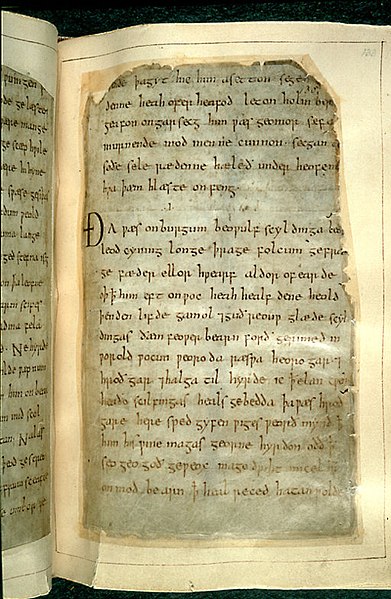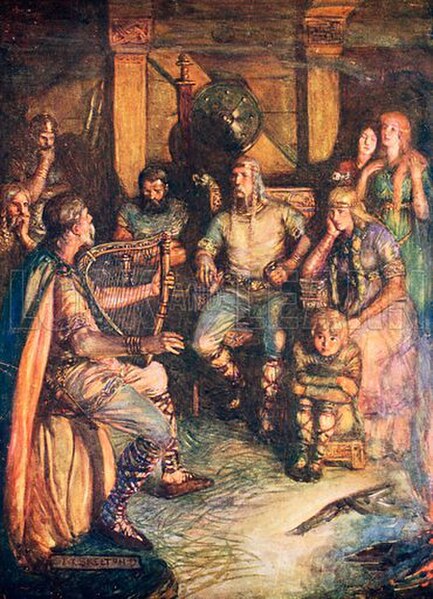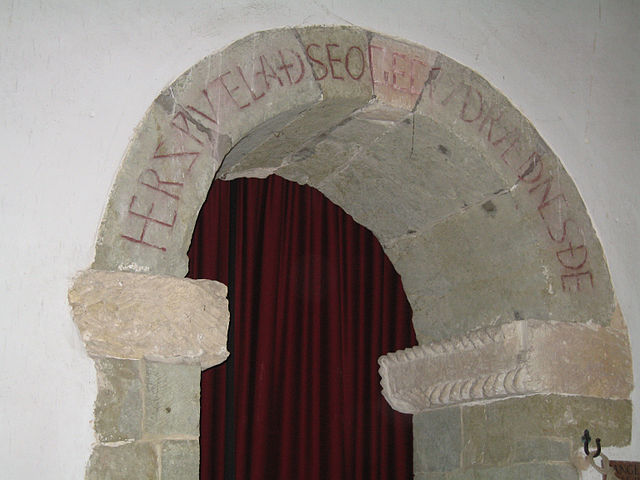Beowulf
Videos
Page
Beowulf is an Old English epic poem in the tradition of Germanic heroic legend consisting of 3,182 alliterative lines. It is one of the most important and most often translated works of Old English literature. The date of composition is a matter of contention among scholars; the only certain dating is for the manuscript, which was produced between 975 and 1025 AD. Scholars call the anonymous author the "Beowulf poet".
The story is set in pagan Scandinavia in the 6th century. Beowulf, a hero of the Geats, comes to the aid of Hrothgar, the king of the Danes, whose mead hall Heorot has been under attack by the monster Grendel for twelve years. After Beowulf slays him, Grendel's mother takes revenge and is in turn defeated. Victorious, Beowulf goes home to Geatland and becomes king of the Geats. Fifty years later, Beowulf defeats a dragon, but is mortally wounded in the battle. After his death, his attendants cremate his body and erect a barrow on a headland in his memory.

First page of Beowulf in Cotton Vitellius A. xv. Beginning: HWÆT. WE GARDE / na in geardagum, þeodcyninga / þrym gefrunon... (Translation: What! [=Listen!] We of Spear-Da/nes, in days gone by, of kings / the glory have heard...)

Remounted page, British Library Cotton Vitellius A.XV

The traditional view is that Beowulf was composed for performance, chanted by a scop (left) to string accompaniment, but modern scholars have suggested its origin as a piece of written literature borrowed from oral traditions. Illustration by J. R. Skelton, c. 1910
Old English
Videos
Page
Old English, or Anglo-Saxon, is the earliest recorded form of the English language, spoken in England and southern and eastern Scotland in the early Middle Ages. It developed from the languages brought to Great Britain by Anglo-Saxon settlers in the mid-5th century, and the first Old English literary works date from the mid-7th century. After the Norman Conquest of 1066, English was replaced for several centuries by Anglo-Norman as the language of the upper classes. This is regarded as marking the end of the Old English era, since during the subsequent period the English language was heavily influenced by Anglo-Norman, developing into what is now known as Middle English in England and Early Scots in Scotland.

Alfred the Great statue in Winchester, Hampshire. The 9th-century English King proposed that primary education be taught in English, with those wishing to advance to holy orders to continue their studies in Latin.

Her sƿutelað seo gecƿydrædnes ðe ('Here the Word is revealed to thee'). Old English inscription over the arch of the south porticus in the 10th century St Mary's parish church, Breamore, Hampshire

The first page of the Beowulf manuscript with its opening Hƿæt ƿē Gārde/na ingēar dagum þēod cyninga / þrym ge frunon... "Listen! We of the Spear-Danes from days of yore have heard of the glory of the folk-kings..."